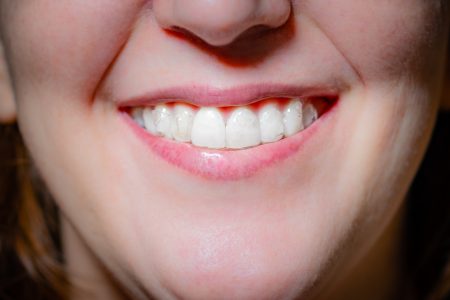 It goes without saying that a lot of thought is put into a smile’s appearance. After all, it is often the first asset one notices about a person, and having a beautiful gleam can instill levels of confidence. While health is the top priority, appearance is valued much higher than many might believe. This means that treatment or procedures that alter our appearance or even distract from it can result in a negative impact on one’s self-esteem. In today’s blog, your Overland Park, KS dentist will take a look at the importance of alignment, and how Invisalign® invisible aligners can help correct this concern in a discreet manner.
It goes without saying that a lot of thought is put into a smile’s appearance. After all, it is often the first asset one notices about a person, and having a beautiful gleam can instill levels of confidence. While health is the top priority, appearance is valued much higher than many might believe. This means that treatment or procedures that alter our appearance or even distract from it can result in a negative impact on one’s self-esteem. In today’s blog, your Overland Park, KS dentist will take a look at the importance of alignment, and how Invisalign® invisible aligners can help correct this concern in a discreet manner.
A Lifelike Finish With Dental Bonding
 The last thing your dentist wants to do is extract your tooth. After all, adult teeth are considered permanent, which means once they are gone, they will not come back. For that reason, extraction is often only considered if it will benefit your overall oral health. To best avoid this dilemma in the first place, we encourage a well-rounded preventive routine to keep your smile in tip-top condition. Even still, accidents can occur at any time, causing a range of complications from significant trauma to only surface-level blemishes. In today’s blog, your Overland Park, KS dentist takes a look at the important role that cosmetic dentistry can play in loving the smile you are in, and how bonding and contouring can yield lifelike results.
The last thing your dentist wants to do is extract your tooth. After all, adult teeth are considered permanent, which means once they are gone, they will not come back. For that reason, extraction is often only considered if it will benefit your overall oral health. To best avoid this dilemma in the first place, we encourage a well-rounded preventive routine to keep your smile in tip-top condition. Even still, accidents can occur at any time, causing a range of complications from significant trauma to only surface-level blemishes. In today’s blog, your Overland Park, KS dentist takes a look at the important role that cosmetic dentistry can play in loving the smile you are in, and how bonding and contouring can yield lifelike results.
Why Extraction Might Be Warranted
 You often hear of the importance of maintaining an excellent preventive routine so you’re your smile is in tip-top condition. After all, adult teeth are considered permanent, and the last thing one wants is to lose their natural shine. In anticipation of the many factors that negatively impact our health, restorative measures such as crowns and root canal therapy offer a sort of safety net in order to restore function and strength. In some cases, however, it may be too late and this step will not suffice. In today’s blog, your Overland Park, KS dentist takes a look at times in which extraction might be the only viable option left.
You often hear of the importance of maintaining an excellent preventive routine so you’re your smile is in tip-top condition. After all, adult teeth are considered permanent, and the last thing one wants is to lose their natural shine. In anticipation of the many factors that negatively impact our health, restorative measures such as crowns and root canal therapy offer a sort of safety net in order to restore function and strength. In some cases, however, it may be too late and this step will not suffice. In today’s blog, your Overland Park, KS dentist takes a look at times in which extraction might be the only viable option left.
Versatility With Restorative Crowns
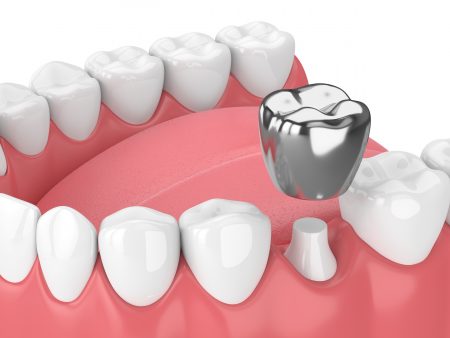 It is no surprise that there are more factors out there that can harm our smile than there are ones that can ensure its safety. After all, our grins endure significant wear over the years, and time itself even plays a factor. Because of this, restorative dental procedures play an integral part in your overall health, as sometimes preventive dentistry can only do so much. In today’s blog, your Overland Park, KS dentist will take a look at the benefits of restorative dentistry, and specifically, how dental crowns offer versatility in preserving your natural teeth.
It is no surprise that there are more factors out there that can harm our smile than there are ones that can ensure its safety. After all, our grins endure significant wear over the years, and time itself even plays a factor. Because of this, restorative dental procedures play an integral part in your overall health, as sometimes preventive dentistry can only do so much. In today’s blog, your Overland Park, KS dentist will take a look at the benefits of restorative dentistry, and specifically, how dental crowns offer versatility in preserving your natural teeth.
Schedule Your Next Oral Cancer Screening
 When you attend your dental appointment, usually it is to check in on your grin and ensure that it is happy and healthy. While concerns such as decay and infection are often the most common dental issues that an individual may face, they certainly are not the only ones. In fact, almost anything can be detrimental to your health, especially if proper steps are not taken to ensure its protection. In today’s blog, your Overland Park, KS dentist will discuss the ways that less common concerns such as oral cancer impact your smile, as well as steps you can take to reduce your risk.
When you attend your dental appointment, usually it is to check in on your grin and ensure that it is happy and healthy. While concerns such as decay and infection are often the most common dental issues that an individual may face, they certainly are not the only ones. In fact, almost anything can be detrimental to your health, especially if proper steps are not taken to ensure its protection. In today’s blog, your Overland Park, KS dentist will discuss the ways that less common concerns such as oral cancer impact your smile, as well as steps you can take to reduce your risk.
Is It Time To Replace Your Lost Tooth?
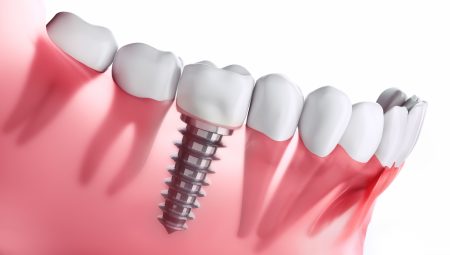 Losing a tooth as a child can be an exciting moment, as your adult teeth are coming in and you may receive a visit from the tooth fairy. Losing a structure as an adult, on the other hand, is a much more concerning event. Adult teeth are considered permanent, meaning once they are gone, they are gone for good. This not only impacts your smile’s appearance, but your oral function as well. In today’s blog, your Overland Park, KS dentist will look at the way implant dentistry can address these concerns in an optimal manner, completing your smile once more.
Losing a tooth as a child can be an exciting moment, as your adult teeth are coming in and you may receive a visit from the tooth fairy. Losing a structure as an adult, on the other hand, is a much more concerning event. Adult teeth are considered permanent, meaning once they are gone, they are gone for good. This not only impacts your smile’s appearance, but your oral function as well. In today’s blog, your Overland Park, KS dentist will look at the way implant dentistry can address these concerns in an optimal manner, completing your smile once more.
It’s Time To Restore That Shine
 Dental decay may be the biggest threats to most smiles, but it is not the only threat. In fact, there are a number of factors and concerns that impact your grin, from the effects of bruxism and sleep apnea, to internal infections and more. While maintaining consistent preventive care and ensuring an optimally-functioning smile is a top priority, sometimes concerns can be minor in nature but cause your grin to appear off. In today’s blog, your Overland Park, KS dentist will address circumstances in which your smile needs a touch-up and explain how a teeth-whitening procedure can help.
Dental decay may be the biggest threats to most smiles, but it is not the only threat. In fact, there are a number of factors and concerns that impact your grin, from the effects of bruxism and sleep apnea, to internal infections and more. While maintaining consistent preventive care and ensuring an optimally-functioning smile is a top priority, sometimes concerns can be minor in nature but cause your grin to appear off. In today’s blog, your Overland Park, KS dentist will address circumstances in which your smile needs a touch-up and explain how a teeth-whitening procedure can help.
Is Daytime Fatigue Slowing You Down?
 It goes without saying that for most individuals, the largest threat to the quality and function of their smiles involves trouble brought on by harmful bacteria, more specifically decay and infection. While this is considered the norm, there exists a population of individuals that experience a much bigger threat – that of sleep apnea and its impact on their health. In today’s blog, your Overland Park, KS dentist will take a look at the effects of sleep apnea and what we can do to treat the disorder.
It goes without saying that for most individuals, the largest threat to the quality and function of their smiles involves trouble brought on by harmful bacteria, more specifically decay and infection. While this is considered the norm, there exists a population of individuals that experience a much bigger threat – that of sleep apnea and its impact on their health. In today’s blog, your Overland Park, KS dentist will take a look at the effects of sleep apnea and what we can do to treat the disorder.
Addressing Tooth Loss From One Structure To Several
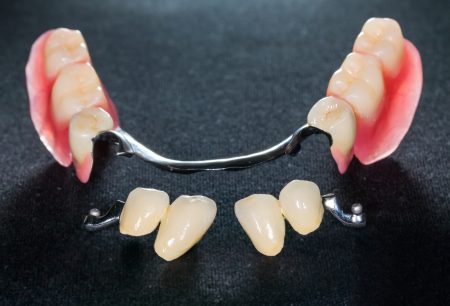 In last week’s blog, our team discussed the different ways we can address tooth decay as it progresses, from a dental filling to a root canal and finally resulting in extraction. While removing a compromised structure is certainly a priority once it progresses past the point of saving, keep in mind that even bigger problems may arise if you do not replace that missing tooth. In today’s blog, your Overland Park, KS dentist will look at the ways we can restore your smile with prosthetic dentistry as decay continues to spread.
In last week’s blog, our team discussed the different ways we can address tooth decay as it progresses, from a dental filling to a root canal and finally resulting in extraction. While removing a compromised structure is certainly a priority once it progresses past the point of saving, keep in mind that even bigger problems may arise if you do not replace that missing tooth. In today’s blog, your Overland Park, KS dentist will look at the ways we can restore your smile with prosthetic dentistry as decay continues to spread.
When Extraction Is The Best Option
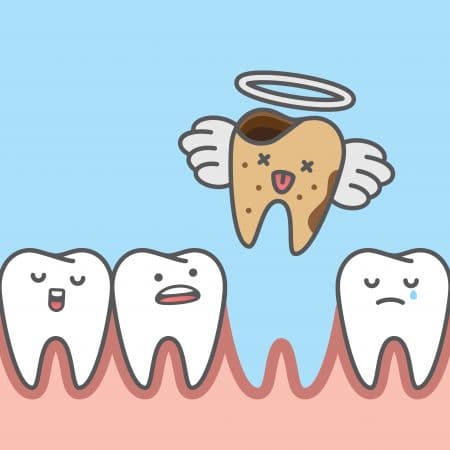 Because oral bacteria are present in every grin, it is only natural that concerns such as decay, infection, and tooth loss are something to keep in the forefront of your mind. Indeed, having an understanding that excellent oral health care is a necessity is one thing, but actually putting that theory into practice is another. The correct balance of brushing and flossing at home, attending routine checkups, and paying mind to your diet plays a major role in accomplishing a lifelong smile, but falling short of any of the steps can result in the concerns listed above. In today’s blog, your Overland Park, KS dentist will address what happens when you are not on top of your preventive care and how it may result in the need to extract a tooth.
Because oral bacteria are present in every grin, it is only natural that concerns such as decay, infection, and tooth loss are something to keep in the forefront of your mind. Indeed, having an understanding that excellent oral health care is a necessity is one thing, but actually putting that theory into practice is another. The correct balance of brushing and flossing at home, attending routine checkups, and paying mind to your diet plays a major role in accomplishing a lifelong smile, but falling short of any of the steps can result in the concerns listed above. In today’s blog, your Overland Park, KS dentist will address what happens when you are not on top of your preventive care and how it may result in the need to extract a tooth.
